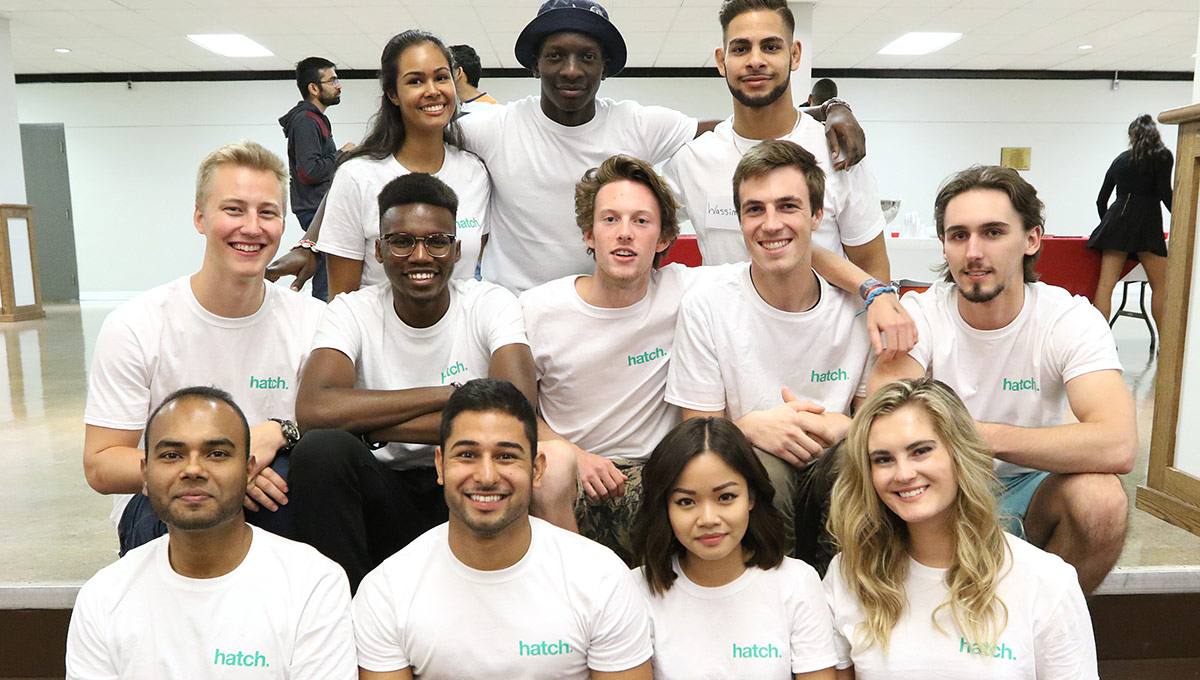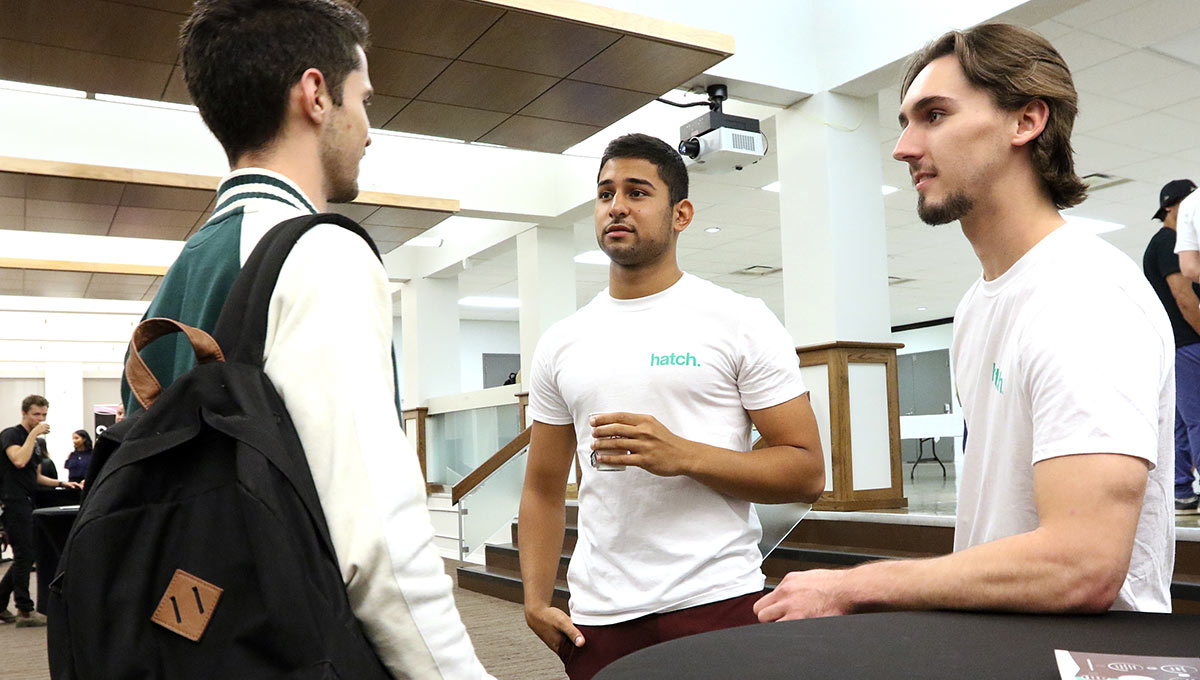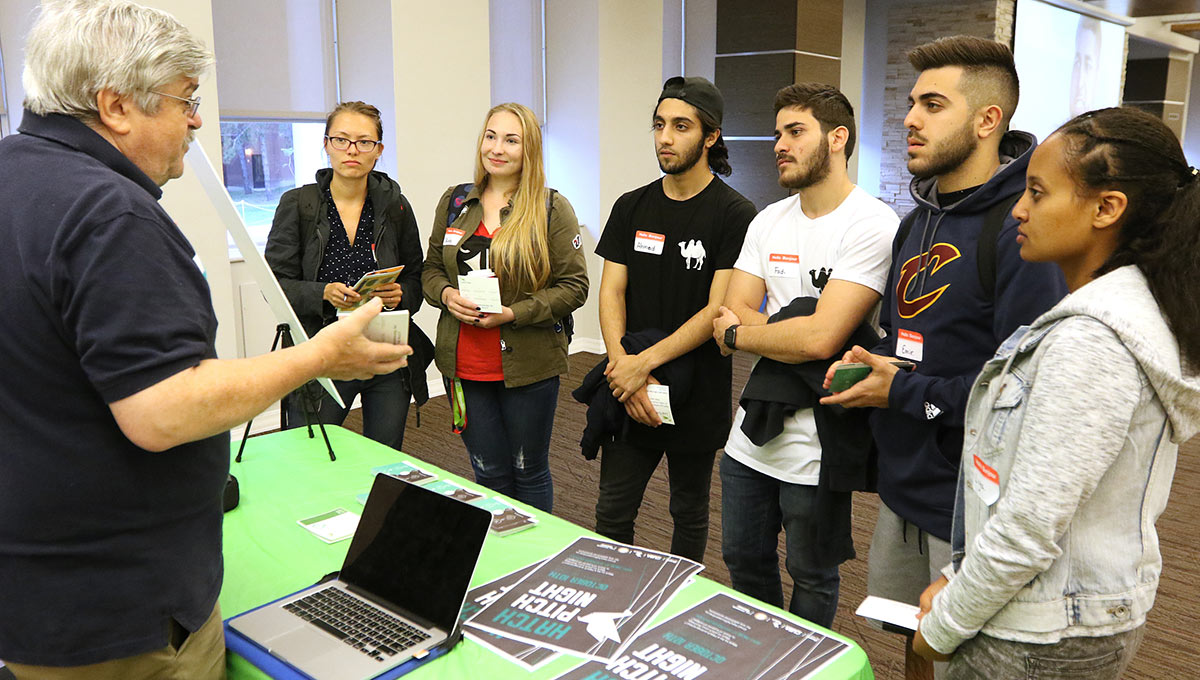By Tyrone Burke
Photos by Mike Pinder
We live in an age of big ideas.
But how exactly do you transform a great concept into the next global business empire, or at least the next thriving side hustle?
Every entrepreneur defines success differently, but all of them face similar challenges to achieving it.
Carleton’s Hatch program helps students prepare themselves to rise to the occasion. The student-led program works with budding entrepreneurs to develop their business plans and connects them with investors, partners and a community of like-minded peers.

Hatch helped Cole Miller land a $150,000 investment on Dragon’s Den
It’s the launching pad that helped Cole Miller and Twelve Barrels whiskey land a $150,000 investment on Dragon’s Den, and set Mallory Rowan and Josh Reyes’ powerlifting apparel brand LVD Fitness along the path to $1 million in annual revenue.
“We’ve generated amazing entrepreneurs,” says Melissa Vong, Hatch’s director and lead organizer.
“We’ve given students almost $300,000 in grants through Lead to Win, Ontario Centres of Excellence and other programs.”

Word is Getting Out About Hatch
At Hatch’s first event of the year – a meet and greet featuring Ottawa Mayor Jim Watson — Vong’s excitement is palpable. She’s been building the student incubator for three years and word is starting to get around. More than 100 students signed up on Facebook to attend the session. And last year’s team of two directors and two marketing managers has ballooned to a volunteer staff of 15.
For Vong, it’s not only about fostering entrepreneurship on campus, it’s about developing her entrepreneurial skill set.
“I ran my first business without much experience,” she says. Vong launched a travel start-up during her first year at Carleton, but her inexperience (and the challenge of running a start-up while studying full-time) caught up with her.

Melissa Vong was featured in Carleton’s CU75 Campaign in 2015 for her entrepreneurial leadership.
Despite strong revenue, the business encountered challenges. Vong shuttered it, at least temporarily. Since then, she’s invested in real estate and is managing multiple rental units, but she’s not ruling out getting back into the travel business down the road.
“Knowing that in our first year we made almost $100,000, that’s just incredible for having no experience. With the experience I’ve gained, I know that we can just blow that up. Through Hatch, I’ve gained so much knowledge. I know that the next business I go into, I won’t make those same mistakes. I have connections. I have a great network, a support system, a board of advisers.”

Building a Network for Student Entrepreneurs
Building a broad network wasn’t always straightforward. Hatch’s roots are in the Sprott School of Business and at first, Vong was mostly connecting with other business students.
“To a business, it doesn’t matter what program you’re in,” she says. “You need an entrepreneur, a software engineer, a graphic designer. This year, we have a huge engineering presence. We’ve been branching out to different faculties and getting ourselves into different events like hack-a-thons.”
Last year, Vong brought on an engineer to serve as co-director. Rayhan Memon is a biomedical and electrical engineering student, and he’s helping connect the “ideas” people with their more technical peers.
“People have ideas for apps, websites, other technically inclined things,” Memon says, “but they aren’t necessarily technically inclined themselves, so they need people to help them out.”

Rayhan Memon networks during the Hatch Green Carpet event in September 2017.
Hatch has 10 grants of $1,500 available to help top entrepreneurs with the expenses associated with starting their businesses, and it connects into one of North America’s top university start-up ecosystems, the award-winning Lead to Win accelerator.
“Lead to Win is for when your company is more than just an idea,” says Tony Bailetti, the program’s director.
“Companies accepted into Lead to Win are aiming to hit $1 million in revenue within three years. Hatch is one of our feeder programs. We’ve had a variety of companies come through it, and they’ve done very well.”
In Lead to Win, students are eligible for programs like the Nicol Internships – which offer $7,000 to $7,500 and office space for four to six students each semester – one more stepping stone on the path to profitability.
“As soon as I tell people what Hatch does, they tell me about their business idea and ask what it can do for them,” says Memon. “Everyone wants to take advantage of Hatch, but very few know it exists. That’s something we want to change. We want people to know that Hatch is a ‘thing’ on campus, a path they can take. There is so much fear starting a business. You have to put yourself in environments where it is the new norm. In Hatch, I see no fear, with all of these people starting businesses, all this talk about entrepreneurship. It’s an amazing thing; it makes it seem so normal.”
And it is.

Entrepreneurship Enters the Mainstream
The way that business is done has shifted dramatically as we’ve entered the digital age. Entrepreneurship has become the norm.
“As the online environment has evolved, so has the opportunity for people to create new futures for themselves,” says Rowland Few, an instructor in Entrepreneurship at Sprott who supports the Hatch program.
With more than 30 years of business experience, Few believes that entrepreneurship has become an essential part of business education.

Carleton University Women in Business networks at the Hatch Green Carpet event.
“Everything is online now. Whereas before it was traditional to go work at a large company, now you can build your own. You could work somewhere and build a company on the side. You can do it whilst you’re studying, and you could finish your degree with a viable business and significant revenue. You would never have to look for a job again. We have a responsibility to educate and share, to show how the world has changed and is changing. There are significant opportunities ahead, if you look at entrepreneurship as another discipline in management and business. Yes, there are risks, but every company is around today was once an entrepreneurial venture and most still are. If you don’t innovate and you don’t think in an entrepreneurial fashion, you can’t compete.”

Monday, November 6, 2017 in Entrepreneurship, Student Experience
Share: Twitter, Facebook



